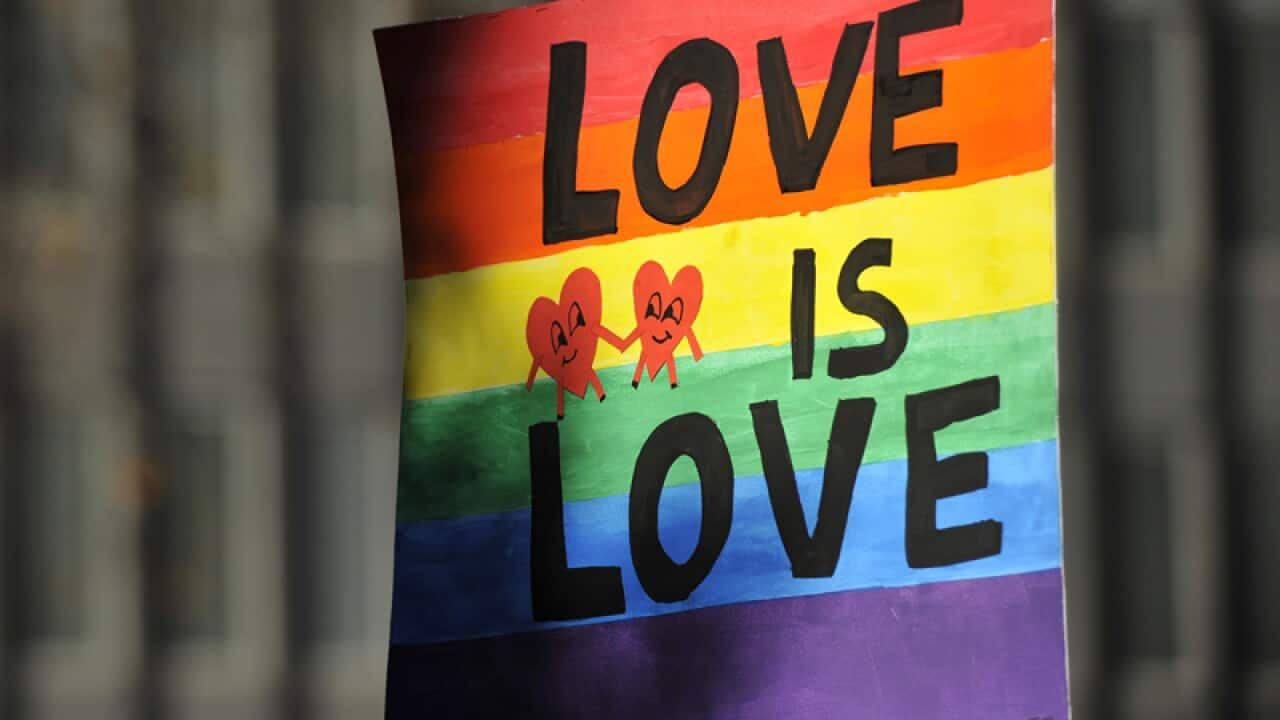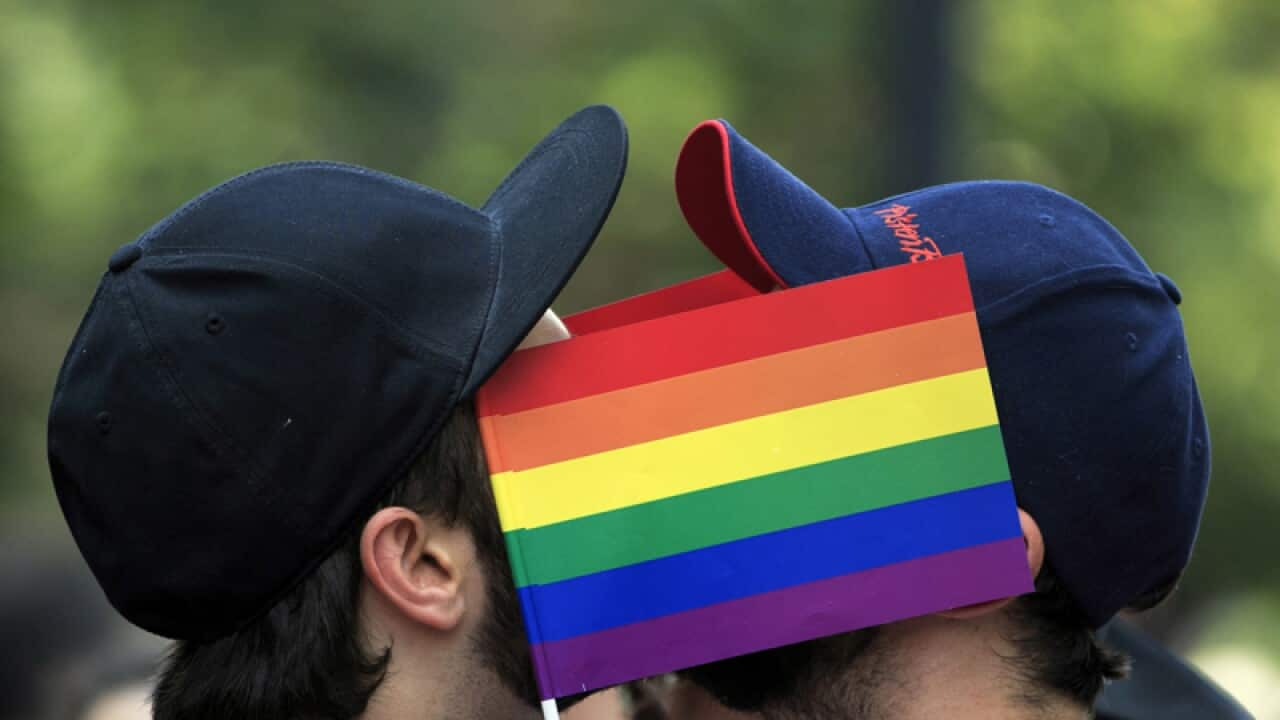While the homophobia he experienced in the Christian community never shook his faith, at times it did make him feel uncomfortable and unsafe going to church, both in Malaysia and in Australia, where he moved to study.
“I thought that Australia might have passed that, but that wasn’t the case,” Mr Oh told SBS.
"I heard church leaders, Catholic leaders, saying things that were very, very demoralising and very dehumanising,” he said.
With his family and his partner, Mr Oh now attends Saint Joseph’s Catholic Church in Newtown in Sydney's Inner West every Sunday.
But the homophobia still present in some parts of the Christian community is something he is hoping to change.
Mr Oh is one of the co-founders of a new cross-denominational organization made up Christian supporters of LGBT+ rights that is hoping to promote acceptance in the church and the broader community.
They also want to provide an alternative political Christian organization to challenge groups such as the Australian Christian Lobby, who oppose same-sex marriage and the Safe Schools school program.
“It is time for a different voice, for a just voice to be loud and clear as juxtaposed to some very small, but very loud Christian voices, who are very unrepresentative of Australian Christians,” Mr Oh said.
by research company Crosby Textor, commissioned by the Australian Marriage Equality, showed 59 per cent of Christians in Australia supported same-sex marriage. However, Australian Christian Lobby Managing Director Lyle Shelton said the survey results reflected those who identify as Christian and not the views of active church members.
However, Australian Christian Lobby Managing Director Lyle Shelton said the survey results reflected those who identify as Christian and not the views of active church members.

Benjamin Oh is one of the co-founders of Equal Voices. Source: SBS News
“Certainly the people who populate the pews in churches, the overwhelming majority of those are in favor of retaining the definition of marriage,” Shelton told SBS.
Last Friday, Equal Voices organized Australia’s first cross-denominational religious ceremony to apologies to LGBT+ people for the way the church and religious community had treated them in the past.
At Saint James Anglican church, the oldest church building in Sydney, around 100 people attended a service presided over by priests from the Anglican, Catholic and Uniting Churches.
The emotional service, held days before the beginning of Lent, involved the priests smearing ash on the forehead of church goers, a traditional ritual of asking God for forgiveness.
Holding back tears, Elaine Dietch and her husband John told the congregation about their difficulty accepting that their son Mark was gay and they said their attitudes contributed to the isolation he felt as a teenager, resulting in depression and a suicide attempt.
“I know there are mothers out there who also want to say ‘I’m sorry, sorry for praying for God to heal you when there was nothing to heal',” Elaine said.
“God accepts you just as you are and we need to accept you just as you are and we are sorry that we didn’t always do that”.
As many as 40 per cent of same-sex couples in Australia identify as Christian, from the Australian Bureau of Statistics. Several LGBT+ Christians at the service said they stopped attending church regularly because they didn’t feel welcome there.
Maria Sullivan, who has been a Catholic Sister of Saint Joseph for more than 50 years, said she was inspired by Pope Francis’ statement in July last year in which he called for the church to apologies for the treatment of LGBT+ people. “I think always down at the grassroots level there has always been a lovely understanding,” Ms Sullivan told SBS.
“I think always down at the grassroots level there has always been a lovely understanding,” Ms Sullivan told SBS.

Reverend Thomas Peacock and Reverend Andrew Sempell. Source: SBS News
“But often the doctrine takes a lot longer and the moral teaching takes a lot longer to move than the people at the grassroots”.
Uniting Church member, Wilma Viswanathan arrived in Australia from Sri Lanka in 1983 and she says she hopes some religious organisations' opposition to same-sex marriage will change over time.
“I’ve always stood for human rights and I think this is a right that all God’s children must have,” she said.
The Australian Christian Lobby’s Lyle Shelton said the church he attends is very welcoming of LGBT+ people, but said in the past some churches have been judgmental.
“I think wherever Christian people have treated other people poorly we should apologise.
"If LGBT people have been treated poorly by churches they should (apologise),” he said.
Reverend Andrew Sempell, rector of the Saint James church, told SBS he believed the apology was an important first step in making churches more accepting of people of all sexualities and genders.
“If you understand that the image of God is in each person, if you understand that we have the spirit of God within us, then that should cause us to treat one another very differently,” he said.
“The apology for me is partly that recognition that we have treated the children of God badly.”
Lifeline: 13 11 14















